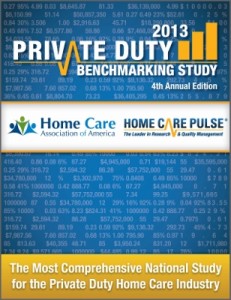According to the 2013 Private Duty Benchmarking Study from Home Care Pulse, the caregiver turnover rate for non-medical home care companies hit an all time high in 2012 at 52.6%. The turnover rate has been growing steadily each year for the past four years.
Turnover Rates:
- 2012 – 52.9%
- 2011 – 49.8%
- 2010 – 46.2%
- 2009 – 39.4%
What’s the Cost of a Bad Hire?
If over half of all caregivers are leaving each year, what does that cost a home care company? Research conducted by Leading Home Care and Caregiver Quality Assurance, using our “Bad Hire Calculator” shows that the typical cost of making a bad hiring decision is over $1,500. If you have 100 caregivers and half of them leave, that will cost you over $75,000 per year. You can do a lot to reduce turnover for $75,000 per year.
To learn more about the cost of a bad hire, check out the recording of a CQA web conference held on May 9, 2013 called “Calculating the Cost of a Bad Hire” which can be purchased for online viewing in our Store. If you are a CQA member, then you can view the recording once you log-in to your account.
How Can I Reduce Turnover?
While there are a number of factors that affect turnover, the two we have found to be most important are:
1. Caregiver Selection
2. Caregiver Appreciation and Recognition
To stem the tide of rising turnover, you need to do a better job of recruiting and selecting high quality caregivers. All of our research shows that companies that use a focused system of caregiver selection and hold themselves to high standards have much better caregiver retention than the rest of the industry.
We also know that the number one factor in caregiver retention is employee appreciation and recognition. When caregivers feel valued and appreciated, they stay longer. The Benchmarking Study tapped into the database of Home Care Pulse to look at their caregiver satisfaction surveys to determine how caregivers want to be shown appreciation. Here’s what the data says:
1. Verbal Recognition by Supervisor – 30.4%
2. Pay Raise – 29.0%
3. Recognition by Client – 15.9%
4. Vacation time, Bonuses, Gift cards – 12.5%
5. Company wide recognition – 12.2%
For more information on recruiting, selecting, training, and retaining your caregivers, office staff, and sales professionals, become an active member of Caregiver Quality Assurance.




